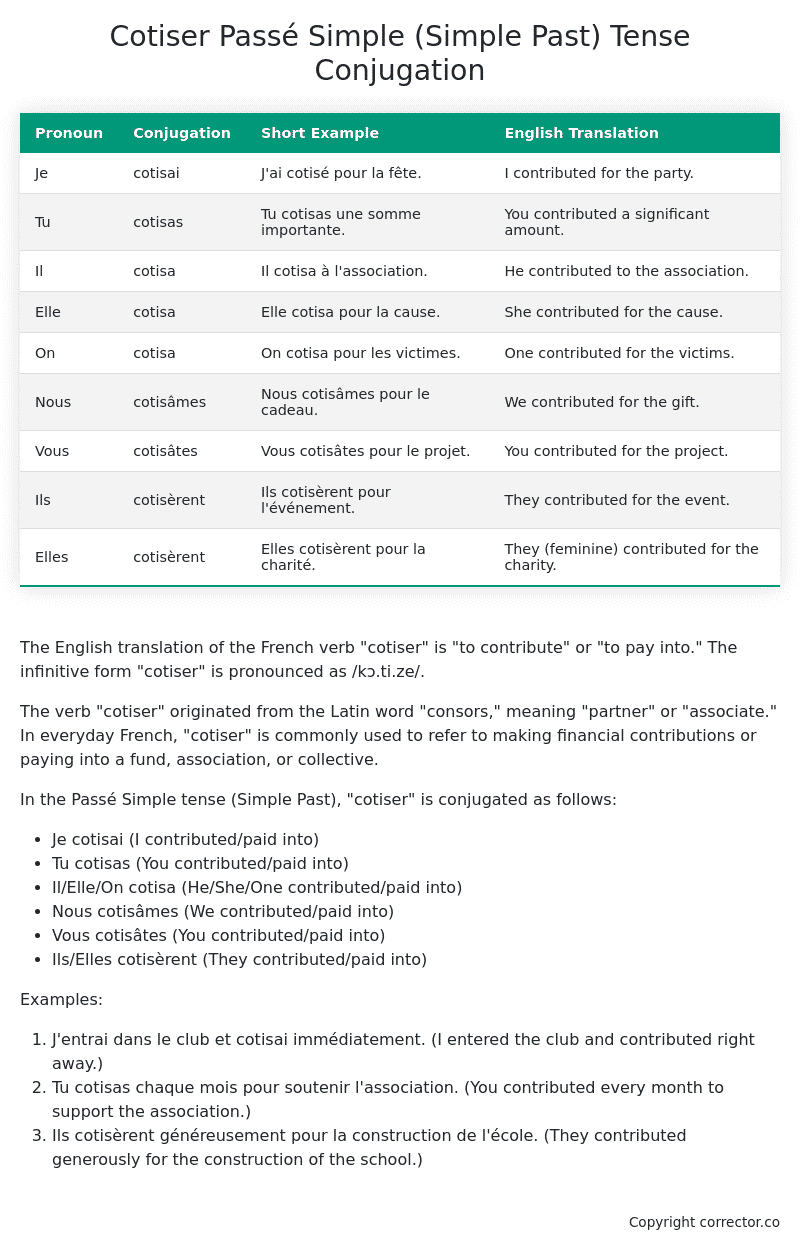Passé Simple (Simple Past) Tense Conjugation of the French Verb cotiser
Introduction to the verb cotiser
The English translation of the French verb “cotiser” is “to contribute” or “to pay into.” The infinitive form “cotiser” is pronounced as /kɔ.ti.ze/.
The verb “cotiser” originated from the Latin word “consors,” meaning “partner” or “associate.” In everyday French, “cotiser” is commonly used to refer to making financial contributions or paying into a fund, association, or collective.
In the Passé Simple tense (Simple Past), “cotiser” is conjugated as follows:
- Je cotisai (I contributed/paid into)
- Tu cotisas (You contributed/paid into)
- Il/Elle/On cotisa (He/She/One contributed/paid into)
- Nous cotisâmes (We contributed/paid into)
- Vous cotisâtes (You contributed/paid into)
- Ils/Elles cotisèrent (They contributed/paid into)
Examples:
- J’entrai dans le club et cotisai immédiatement. (I entered the club and contributed right away.)
- Tu cotisas chaque mois pour soutenir l’association. (You contributed every month to support the association.)
- Ils cotisèrent généreusement pour la construction de l’école. (They contributed generously for the construction of the school.)
Table of the Passé Simple (Simple Past) Tense Conjugation of cotiser
| Pronoun | Conjugation | Short Example | English Translation |
|---|---|---|---|
| Je | cotisai | J’ai cotisé pour la fête. | I contributed for the party. |
| Tu | cotisas | Tu cotisas une somme importante. | You contributed a significant amount. |
| Il | cotisa | Il cotisa à l’association. | He contributed to the association. |
| Elle | cotisa | Elle cotisa pour la cause. | She contributed for the cause. |
| On | cotisa | On cotisa pour les victimes. | One contributed for the victims. |
| Nous | cotisâmes | Nous cotisâmes pour le cadeau. | We contributed for the gift. |
| Vous | cotisâtes | Vous cotisâtes pour le projet. | You contributed for the project. |
| Ils | cotisèrent | Ils cotisèrent pour l’événement. | They contributed for the event. |
| Elles | cotisèrent | Elles cotisèrent pour la charité. | They (feminine) contributed for the charity. |
Other Conjugations for Cotiser.
Le Present (Present Tense) Conjugation of the French Verb cotiser
Imparfait (Imperfect) Tense Conjugation of the French Verb cotiser
Passé Simple (Simple Past) Tense Conjugation of the French Verb cotiser (You’re reading it right now!)
Passé Composé (Present Perfect) Tense Conjugation of the French Verb cotiser
Futur Simple (Simple Future) Tense Conjugation of the French Verb cotiser
Futur Proche (Near Future) Tense Conjugation of the French Verb cotiser
Plus-que-parfait (Pluperfect) Tense Conjugation of the French Verb cotiser
Passé Antérieur (Past Anterior) Tense Conjugation of the French Verb cotiser
Futur Antérieur (Future Anterior) Tense Conjugation of the French Verb cotiser
Subjonctif Présent (Subjunctive Present) Tense Conjugation of the French Verb cotiser
Subjonctif Passé (Subjunctive Past) Tense Conjugation of the French Verb cotiser
Subjonctif Imparfait (Subjunctive Imperfect) Tense Conjugation of the French Verb cotiser
Subjonctif Plus-que-parfait (Subjunctive Pluperfect) Tense Conjugation of the French Verb cotiser
Conditionnel Présent (Conditional Present) Tense Conjugation of the French Verb cotiser
Conditionnel Passé (Conditional Past) Tense Conjugation of the French Verb cotiser
Conditionnel Passé II (Conditional Past II) Tense Conjugation of the French Verb cotiser
L’impératif Présent (Imperative Present) Tense Conjugation of the French Verb cotiser
L’impératif Passé (Imperative Past) Tense Conjugation of the French Verb cotiser
L’infinitif Présent (Infinitive Present) Tense Conjugation of the French Verb cotiser
L’infinitif Passé (Infinitive Past) Tense Conjugation of the French Verb cotiser
Le Participe Présent (Present Participle) Tense Conjugation of the French Verb cotiser
Le Participe Passé (Past Participle) Tense Conjugation of the French Verb cotiser
Struggling with French verbs or the language in general? Why not use our free French Grammar Checker – no registration required!
Get a FREE Download Study Sheet of this Conjugation 🔥
Simply right click the image below, click “save image” and get your free reference for the cotiser Passé Simple tense conjugation!

Cotiser – About the French Passé Simple (Simple Past) Tense
Formation
Usage
Narration
Historical Context
Interactions with other tenses
Passé Composé
Imparfait
Conditional and Subjunctive
Summary
I hope you enjoyed this article on the verb cotiser. Still in a learning mood? Check out another TOTALLY random French verb conjugation!


